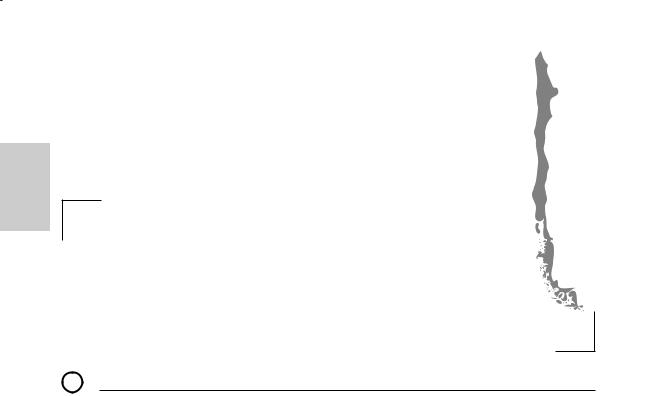
- •Contents
- •Preface
- •Introduction
- •Cultural Orientation
- •Argentina
- •Austria
- •Australia
- •Belarus
- •Belgium
- •Belize
- •Bolivia
- •Brazil
- •Canada
- •Chile
- •China
- •Hong Kong
- •Colombia
- •Costa Rica
- •Czech Republic
- •Denmark
- •Ecuador
- •Egypt
- •Finland
- •France
- •Germany
- •Greece
- •Guatemala
- •Honduras
- •Hungary
- •India
- •Indonesia
- •Ireland
- •Israel
- •Italy
- •Japan
- •Kuwait
- •Malaysia
- •Mexico
- •The Netherlands
- •New Zealand
- •Norway
- •Pakistan
- •Panama
- •Paraguay
- •Peru
- •Philippines
- •Poland
- •Portugal
- •Romania
- •Russia
- •Saudi Arabia
- •Singapore
- •South Africa
- •South Korea
- •Spain
- •Sweden
- •Switzerland
- •Taiwan
- •Thailand
- •Turkey
- •Ukraine
- •United Kingdom
- •United States
- •Uruguay
- •Venezuela
- •Vietnam
- •Index

Chile
Republic of Chile
Local short form: Chile
Local long form: Republica de Chile
Chile
Cultural Note
Chileans have a renowned reputation for achievement in many cultural fields. Literature, social science, and fine arts are considered prestigious areas of study. Since the 1920s, Chile has challenged Argentina’s place as South America’s biggest producer of books in the Spanish language.
A Chilean also created Latin America’s answer to Mickey Mouse: Condorito, a cartoon condor dressed in a red beret, red shirt, and black soccer (fútbol) shorts. Created by the late cartoonist René Ríos Boettiger,
Condorito is one of the most beloved cartoon characters in the world. Syndicated in every Spanish-speaking country, Condorito has been used to sell everything from food to Microsoft Windows.
●3 What is Your Cultural IQ?
1.True or False: The date of September 11 is remembered with sadness by many Chileans.
ANSWER: True. but not because of the terrorist attacks in the United States on September 11, 2001. The Chileans remember September 11, 1973, when the Marxist government of Salvador Allende was overthrown in a military coup backed by the CIA. The subsequent seventeen years of military rule were accompanied by repression, torture, and executions (although they also ushered in economic prosperity).
2.Which of the following is not true about Chile?
a.If placed in Europe, Chile would stretch from the north of Scotland to the island of Gibraltar in the Mediterranean.
b.Chile is almost as long as California.
c.To fit the entire country on a television screen, Chile’s weather maps have to divide the country into three parts.
d.If placed horizontally, Chile would stretch across the Pacific Ocean at its widest point.
ANSWER: d. Chile is long, but not that long.
3.Which of the following famous Chilean authors have won the Nobel Prize for literature?
a)Isabel Allende
b)Gabriela Mistral
c)Pablo Neruda
d)None of the above
ANSWER: b and c. Of the three, only Isabel Allende has never received a Nobel.
80

Chile |
81 |
Cultural Note
Many North American gestures have completely different meanings in other countries. In Chile, slapping your right fist into your left open palm is obscene, and displaying an open palm with the fingers splayed means “stupid.”
●3 Country Background
History
The first European settlers in Chile were Spanish explorers in search of gold and silver, who arrived after the defeat of the Inca empire in 1533. What they found instead was a fertile valley. Chile soon became part of the Spanish empire, governed from Peru.
Bernardo O’Higgins, Chile’s renowned patriot, led a struggle for independence against the Spanish from 1810 to 1818. Helped by an army trained by Argentine patriot José de San Martín, Chilean independence was formally declared on February 12, 1818.
During the nineteenth century, Chile expanded its territories. A treaty with Argentina gave Chile control of the Strait of Magellan (although most of Patagonia went to Argentina). Chile twice fought Peru and Bolivia for control of the Pacific coast. In 1883, Chile won the War of the Pacific, expanding the country’s territory northward to an area rich in natural resources. Relations with Bolivia remain difficult to this day, as the now-landlocked Bolivia has never reconciled itself to the loss of its entire Pacific seaboard.
In 1964, Eduardo Frei, a Christian Democrat, was elected to the presidency. His program was marked by the slogan “Revolution in Liberty” and consisted of far-reaching social programs. In the next election, in 1970, Dr. Salvador Allende won with 36 percent of the votes over two other candidates, becoming the first freely elected Marxist leader in this hemisphere. But Allende did not have majority support in the Chilean Congress, and discontent grew as a result of shortages of food and consumer goods. On September 11, 1973, a bloody, CIA-backed military coup overthrew Allende, abolished the Congress, and banned political parties. A four-man military junta instituted a repressive regime. The leading general, Augusto Pinochet Ugarte, ruled as president and commander of the army.
In 1980, a new constitution was approved in a national plebiscite. Under it, General Pinochet was elected to an eight-year term, with the military junta acting as the legislature. At the end of that term, Pinochet allowed another plebiscite to decide if he should continue for another eight years. When he lost the plebiscite, he called for free elections in December 1989. As a result of that election, President Patricio Aylwin Azócar took office in March 1990 as the first elected president since 1970. Since then, political power has passed peacefully from one elected government to the next. In 2006, Chile swore in a new President, Michelle Bachelet, who was an unprecedented leader for a traditionally conservative, generally Catholic country. Prior to serving as President she was Secretary of Defense and supervised some of the same military personnel who had overseen her own inprisonment,
Chile

82 |
Kiss, Bow, or Shake Hands |
Chile
torture, and her father’s murder. One Chilean reporter explained her election thus: When we go into the booth, we vote with our souls, not our wallets.
Type of Government
The Republic of Chile is a multiparty republic with two legislative houses, the Senate and the Chamber of Deputies. The president is the chief of state as well as the head of the government.
Suffrage is universal and compulsory at age eighteen.
The current government is considered stable; however, it must still address continued problems from poverty. For current government data, check with the Embassy of Chile at www.chile-usa.org.
Language
The official language of Chile is Spanish, although English is spoken by well-educated businesspeople and in tourist centers. Chileans speak a very conservative form of Spanish. In most of Latin America, the second-person plural of verbs is ignored (the third-person plural is used instead). Chileans, however, continue to use the traditional second-person plural form of the verb.
The Web site www.ethnologue.com lists a total of eleven languages, two of which are extinct and several of which are endangered. Aside from Spanish, all the other languages are Amerindian—except for the Polynesian language Rapa Nui, spoken by the 2,500 natives of Easter Island (a Chilean possession).
The Chilean View
There is no official religion in Chile, but over 78 percent of the population identify themselves as Roman Catholics. As in most European countries, relatively few people attend church every Sunday. Protestants account for over 13 percent. There is also a small Jewish population. A sizable number of people consider themselves nonreligious or atheist.
Chile is prone to natural disasters (earthquakes, volcanoes, etc.), and some sociologists believe that this is the source of the traditional Chilean pessimism and fatalistic attitude.
In the past, ostentation was rarely seen in public. However, Chile’s recent economic success has made public displays of wealth more common—if not acceptable to traditionalists.
*Know Before You Go
■
Nature has bestowed many things upon Chile, including many dangers. Earthquakes and volcanoes are an ever-present hazard, as are tsunamis (tidal waves) caused by offshore earthquakes.
Some cities in Chile are elevated enough to cause altitude sickness in visitors. Altitude sickness can strike anyone, even if you have never experienced it before. There is no sure prevention except gradual acclimation to high elevation: once you get to 6,000 feet above sea level, spend at least two nights there. Repeat this acclimation period at each

Chile |
83 |
increase of 3,000 feet. Alcohol consumption tends to make the symptoms worse. Sunburn is also a danger at high altitudes, because there is less atmosphere to protect you from the sun.
There is a new hazard in the southernmost part of Chile: the Antarctic ozone hole in the atmosphere. As in high altitudes, sunburn can occur quickly. Sunblock and/or protective clothing (including sunglasses) are the best preventatives.
Many Chileans are heavy smokers. It can be difficult to find smoke-free establishments. International hotel chains tend to be the best at enforcing no-smoking rules.
Although Chile has more than its share of natural hazards, the country lacks many of the dangers associated with other Latin American countries. The roads—especially the main highways—are good, and Chileans are relatively safe, polite drivers. Armed robbery and kidnapping are rare. Corruption (aside from tax evasion) is uncommon. Even the Chilean traffic police (the Carabineros) tend to be honest; they make take an attempt to bribe them as an insult.
Chile
●3 Cultural Orientation
Cognitive Styles: How Chileans Organize and Process Information
In Chile, information is readily accepted for the purpose of discussion. Negotiations may be extensive, with little movement from the initial position. Chileans educated abroad or in foreign business methods may process information conceptually and analytically, but most are associative in their thinking. Typically, Chileans see each problem as having a particular solution rather than looking to a universal rule or law.
Negotiation Strategies: What Chileans Accept as Evidence
In traditional negotiations, Chileans consider feelings more important than facts. The truth is considered to be subjective and personal. In addition, faith in a strong Catholic or Protestant ideology may form the basis for truth.
Value Systems: The Basis for Behavior
This is not a culture of conquerors but of cosmopolitans who assimilated all European cultures into their social strata through marriage. The following three sections identify the Value Systems in the predominant culture—their methods of dividing right from wrong, good from evil, and so forth.
Locus of Decision-Making
Chile has a collectivist culture in which the extended family is a dominating factor in the individual’s decision-making process. The prospect that a bad decision could bring dishonor on one’s group or family is always a factor in decision-making. Expertise is considered less important than membership in the appropriate group. Thus, kinship and friendship play a major role in a person’s business associations. It is essential for a foreigner to become friends with Chileans with whom one wants to do business.

84 |
Kiss, Bow, or Shake Hands |
Chile
Sources of Anxiety Reduction
Chileans evidently have a high index of uncertainty avoidance. As a result, Chileans use laws and morality to give structure to their worldview. (This can be seen in how Chileans wait in orderly lines, as opposed to how some other Latin Americans crowd and push instead of queue.) Social stratification has traditionally been strong in Chile. Marriage into the right family was considered essential, as family ties are a major determinant of success. Chileans used to accept their social class as destiny. However, the economic boom of the 1990s has made class structure less of a determinant. Although relatively few Chileans have gotten rich, the new entrepreneurs are not all from Chile’s upper class.
Issues of Equality/Inequality
On a philosophical level, Chileans consider each individual to have equal rights, and no law needs to be passed to ensure this equality. On a practical level, black and Amerindian Chileans remain discriminated against. There is a small, traditional, class-conscious elite, a bigger middle class than in most other Latin American countries, and a large impoverished underclass. The Chilean masculinity index has been charted as lower than average for Latin America, resulting in more equality for Chilean women, as evidenced by the election of their first female president in 2006.
●3 Business Practices
Punctuality, Appointments, and Local Time
●Be punctual at meetings. Punctuality is appreciated and expected from North Americans. Do not be offended, however, if your counterpart is up to thirty minutes late.
●On the other hand, everyone (even foreigners) is expected to arrive at social functions late. Be at least fifteen minutes late to a dinner and thirty minutes late to a party.
●Remember that many Europeans and South Americans write the day first, then the month, then the year (e.g., December 3, 2010, is written 3.12.10 or 3/12/10). This is the case in Chile.
●The best times to make appointments are from 10:00 a.m. to 12:00 and 2:30 to 5:00 p.m. Following up a late-morning appointment with a business lunch is also popular.
●Make appointments at least one week in advance of your arrival, and reconfirm them when you get there.
●A popular time for vacations is January and February (summer holidays). This is not the time to try to do business in Chile.
●Chile is four hours behind Greenwich Mean Time (G.M.T. –4). This makes it one hour ahead of U.S. Eastern Standard Time (E.S.T. +1). Chile goes on daylight-saving time from mid-October through mid-March.

Chile |
85 |
Cultural Note
The decision-making process is centralized, residing mostly with the upper-level presidente or gerente general. Next in importance comes the gerente, followed by midand low-level managers; all provide support to the upper levels. But all levels usually have input, so business transactions may take place at a slower pace than in North America or Europe. Be patient and expect delays. Several trips may be necessary to conclude a business transaction.
Negotiating
●Personal relationships are paramount in business relations in Chile. The initial visit should be by an upper-level executive, accompanied by midlevel executives. These midlevel executives are the ones who will make subsequent visits to conduct more detailed business negotiations. At a first meeting, spend most of the time establishing a rapport, then gradually steer the conversation toward introducing your firm.
●Attitudes toward trading with North America are positive, despite how Chile’s admittance to the North American Free Trade Area has been delayed for years.
●Conservative values in politics, economics, and social attitudes prevail. Honesty and integrity are highly valued. A sense of humor is appreciated, but generally serious, businesslike behavior is expected.
●There is a strong sense of personal honor on the part of Chilean businesspeople. A single accusation of wrongdoing can follow a Chilean for his or her entire life. Consequently, avoid criticizing a person in public or doing anything that would cause him or her embarrassment.
●Chileans are straightforward and take negotiating quite seriously. A hard-sell approach, however, will not work. Have your bottom line and other terms clearly drawn out. Also outline a strong financial package with options such as nontraditional financing terms.
●Many women are professionally advanced in Chile, and a woman will have better success here than in most other Latin American countries.
●Show commitment to the business relationship through a willingness to provide continued service to your client, despite the long distances involved. Remember that Chileans strive to overcome the isolation imposed on them by geography.
●Making a good impression includes staying at one of the finer international hotels while in Chile.
●Chileans generally converse in closer proximity than North Americans or northern Europeans. Do not pull away from a person who is speaking quite close to you, even if you are uncomfortable. This may be interpreted as a personal affront.
●Try to cover any tattoos you may have while in Chile. To older Chileans, only criminals wear tattoos, although this attitude is changing among the young.
●Have business cards printed with English on one side and Spanish on the other. Present cards to everyone in a meeting except secretaries.
Chile

86 Kiss, Bow, or Shake Hands
|
● |
Third parties are very important for making contacts in Chile. Banks and consulting |
|
|
firms can make introductions. |
|
● |
The business atmosphere tends to be more formal than in other South American coun- |
|
|
tries. Proper etiquette and dress are expected. |
|
|
|
Chile |
● |
Chileans avoid behavior that may appear aggressive. Kindness and respect for others are valued. |
● |
Learn a little about Chile’s history, culture, economy, exports, and so forth, and be prepared to |
|
|
|
discuss them. Appreciation of Chile’s history will impress and please your contacts. |
|
|
|
Cultural Note
Chileans do not bargain in either stores or street markets. Note that it is illegal to sell something and fail to give a receipt. When a receipt is not issued, this often means that the merchant is not declaring the sale on tax reports. Both the buyer and the seller can be fined for this infraction; it is the buyer's responsibility to ask for the receipt when making a purchase.
●3 Business Entertaining
●Breakfast is usually eaten between 7:00 and 9:00 a.m. Breakfast tends to be very light. A substantial number of Chileans eat breakfast in bed (which is possible because even middle-class families can afford a maid and/or cook).
●Lunch, the largest meal of the day, begins anytime from noon to 1:30. Lunch is often a multicourse meal lasting as long as two hours. (The higher-ranking the businessperson, the longer he or she can take for lunch.)
●Between 5:00 and 6:00 p.m., Chileans eat a snack called once. This consists of tea or coffee and light food, such as cookies or cheese. Some Chileans also drink alcohol at this time, which is where the “once” got its name. The traditional Chilean spirit is called aguardiente. Once is the Spanish word for “eleven,” and there are eleven letters in the word aguardiente.
●Dinner is served between 8:00 and 9:00 p.m. Alcohol, in the form of a mixed drink, often starts the dinner. Wine or beer is served during the meal. Dinner ends with coffee, tea or yerba mate—and more alcohol. (Yerba mate is a caffeinated herb served in a gourd. It is more common in the Chilean south. See the entry under Paraguay on how to drink yerba mate.) Men often drink spirits after dinner and expect foreign businessmen to do the same; businesswomen are exempt from this ritual.
●Chileans are very hospitable and often invite foreigners into their home. If you are invited for drinks in the evening, you will probably be asked to stay for dinner as well.
●It is not customary to send a thank-you gift or note following an invitation to a Chilean home, but flowers or candy sent to the hostess in advance are appreciated. If you wish to convey your thanks, do so by telephone rather than by mail.

Chile |
87 |
● |
Entertaining is often done in large hotels and restaurants. Make arrangements concern- |
|
|
|
ing the bill with the maître d’ in advance to avoid competition for paying. If you are a |
|
|
|
guest, reciprocate the hospitality at a later date. |
|
|
● |
Proper table manners are very important in Chile. In general, follow European standards. |
|
|
|
|||
|
Make an attempt to try everything that is served to you. |
Chile |
|
● |
Superstitious Chileans consider it bad luck to pass a salt shaker directly to another per- |
||
|
|||
|
son. Instead, put the salt down on the table within reach of the person. |
|
|
● |
There are several traditions concerning the pouring of wine in Chile. If you pour wine in the |
|
|
|
wrong way, you risk insulting your Chilean hosts. “The wrong way” includes pouring with |
|
|
|
your left hand, or pouring so that the wine splashes against the opposite side of the glass. |
|
|
● |
Good topics of conversation include family, Chilean history, cuisine, wines, and sights |
|
|
|
that they might recommend—including Easter Island, a Chilean possession. Many Chil- |
|
|
|
eans are very interested in world travel, so mention other places you have visited. Skiing |
|
|
|
and fishing are very popular in Chile. Topics to avoid include local politics, human rights |
|
|
|
violations, and religion. Do not criticize Chile, even if your host is doing so. |
|
●3 Protocol
Greetings
●Men will shake hands when greeting someone. Women will often pat each other on the right forearm or shoulder instead of shaking hands. If they are close, women may hug or kiss each other on the cheek.
●At a party, greet and shake hands with each person individually. Do not ask a person his or her occupation directly, but wait for the information to be volunteered.
Titles/Forms of Address
●Do not address a Chilean by his or her first name unless invited to do so. Older executives may wish to use their last names at work. Generally, younger Chileans are more comfortable using first names.
●Futher data is available in Appendix A.
Gestures
●The Chilean people converse at a closer distance than many Asians, North Americans, or Northern Europeans are used to—often with a hand on the other person’s lapel or shoulder. Restrain yourself from trying to back away; a Chilean will probably step forward and close the distance.
●Maintaining eye contact is necessary to show interest and sincerity—something that North Americans may find difficult when speaking to a person at such close quarters.

|
88 |
Kiss, Bow, or Shake Hands |
|
|
● |
At a meal, keep your hands above the table at all times. |
|
|
|
||
|
● |
Do not raise your right fist to head level, as this is a Communist sign. |
|
|
|
||
|
Gifts |
||
|
● |
Gifts are not expected in business until the relationship is a close one. |
|
|
● |
When visiting a Chilean home, send flowers in advance (avoid yellow roses, which sig- |
|
|
|
nify contempt) or bring wine or liquor. Other popular gifts include leather appointment |
|
Chile |
|
books, quality pens or cigarette lighters, perfume, and local crafts from home. |
|
● |
If you receive a gift, open it promptly in the presence of the giver and extend thanks. |
||
|
|||
● |
Give gold jewelry to a girl on her fifteenth birthday. This birthday (called the quinceaňos; |
|
the party is called a quinceaňera) is a very important celebration in Chile; to be invited to |
|
one is a privilege. |
Dress
●Business: Dress is generally equivalent to that in Europe (meaning it is more conservative than in the United States). Men may wear a dark blue or gray suit, a light shirt, and a conservative tie. Bright colors and flashy fashions are not appropriate, nor is wearing anything on the lapel. Women should wear a suit and heels.
●Casual: When not doing business, pants or good jeans and a shirt are appropriate. Shorts will rarely be seen in public. Chile experiences temperature extremes from the beaches to the mountains. You will need warmer clothes at higher altitudes.
